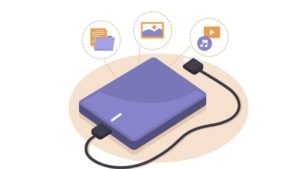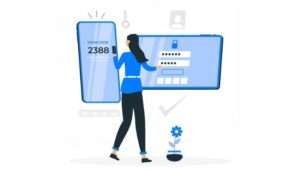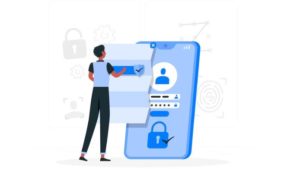Working in-house in an office comes with a fair few benefits. One such example could be that you are not using personal devices.
It is up to the company to ensure the safety protocols, especially those related to the organization’s network.
However, this changes when you switch to working from home. It’s crucial to secure your devices in this setting.
Generally speaking, your internet service provider should provide a secure network, but you cannot rely on them. There are various threats to consider, and the responsibility to secure your devices falls on you.
Also, as a remote worker or freelancer, you might change the scenery and visit a public library or cafe to work there for a few hours. That means joining an unknown network and becoming a potential target.
Having said all that, there are two primary devices that you will use while working. The first is a computer, and the second is your smartphone.
Let’s explore how to secure your devices in these environments smartly.
Table of Contents
Practical Tips to Secure Your Devices
A computer is often the most crucial device in one’s work arsenal, making it vital to secure your device effectively. It is hard to imagine functioning without one in today’s society.
However, since so many people depend on a computer for work and beyond, it becomes an excellent target for hackers.
1. Install Antivirus Software

Some come with built-in security essentials, which are usually enough.
Regardless, it is better to be safe than sorry, and installing a third-party software solution makes sense.
Keep in mind, though, that while antivirus software does its work while running in the background, there is more. You need to initiate and run custom disk scans now and then to compensate for what the tool might have missed while idling in the background.
Whether you are saving an X GIF or opening email attachments, antivirus software has built-in features to flag potential dangers and prevent them from manifesting.
2. Enable Firewall

You might think firewalls are excessive and should be optional, but do not underestimate what they bring.
Sure, it might not prevent you from all types of threats, but it is still good enough to help you avoid:
- Ransomware
- Spyware
- Phishing attacks
- Trojans
The purpose of a firewall is to inspect and process data packets in network traffic to dictate which ones can move and which ones should be blocked.
3. Avoid Piracy

Netflix and Steam were the first to identify that Piracy was rampant because it was, first and foremost, a service problem.
Legitimate sources to consume media are convenient, but they do not eradicate Piracy completely. In fact, plenty of platforms chose user-unfriendly policies, which encouraged Piracy to grow again.
Without in-person supervision, you do not have to worry about getting caught downloading illegal stuff on your computer.
The temptation is understandable, but if you want to feel safe and secure, you are better off avoiding Piracy.
Even with antivirus software and other security measures, you might download a file that infects your computer, and there is no telling how much damage the virus will do.
4. Be Smart About External Devices

To secure your device, it’s crucial when using accessories like printers for paper documents or external hard drives for storage.
For instance, if you plan to clean up the computer by moving some files to minimize digital clutter, getting an external storage accessory is understandable.
Sometimes, you might need to take an unknown external accessory and insert it into your computer.
If that happens, do not simply insert the accessory into the device. Scan it first because you cannot predict what might be in the accessory.
5. Try Browser Extensions

For one, you could get an ad blocker that prevents annoying pop-ups and other advertisements that lead you to shady landing pages.
Some browser extensions also flag incoming emails, though that is one of the expected features in your email service provider, so such an extension may be redundant.
Finally, some extensions block website tracking, letting you maintain privacy while spending time online.
Securing Your Smartphone
A smartphone might not be that necessary for work, but it comes in handy for communication, particularly when you are away from your computer.
Besides, having a secure smartphone helps you avoid anxiety because you rely on it a lot outside of work as well, right?
1. Disable Bluetooth

Start with getting in the habit of disabling your Bluetooth when you do not need it.
Many people leave it on and never bother switching the feature off. The purpose of doing it is pretty straightforward.
By disabling Bluetooth, you take your smartphone out of potentially dangerous networks.
2. Rely on Two-Factor Authentication

2FA is a prevention mechanism when somebody gets unauthorized access to the smartphone.
3. Stick to Official Apps

Or rather, you could stumble upon an app that sounds great but is unavailable on the official app store.
As a rule of thumb, you need to stick to official sources and avoid third-party app distribution platforms.
General Security Tips to Secure Your Devices
General security tips that apply to both devices exist as well. If you want to take your security strategy further, you should implement these.
1. Use a VPN

Connecting to public Wi-Fi comes with certain risks, mainly if a network is available to everyone and needs a password.
To avoid unwanted probing, stick to a virtual private network. VPNs encrypt data and create an impenetrable wall behind your device and attackers on the other side.
Moreover, to further secure your device, remember that a VPN is also beneficial for accessing geo-restricted content, allowing you to change your location and IP address securely.
2. Create a Smart Password Policy

Thus, it would help if you used a tool to store your login credentials that can only be accessed with a master password and 2FA for additional security.
A smart password policy includes a few key steps:
- Complicated and hard-to-crack combinations
- Different passwords for different accounts
- Regular password changes
3. Install Updates

At the same time, OS developers might push a new update because a new security threat is running rampant, infecting user devices.
Missing an update means exposing yourself to new threats. Therefore, when you see a notification indicating that a new operating system version is available, do not hesitate to download it.
Better yet, enable the setting option to download and install updates automatically.
4. Avoid Shady Links

Even if the offer is tempting, you are better off not clicking the link because you need to know where it will take you.
A landing page could be harmful enough that your antivirus tools might not be enough to stop malware and other threats affecting your computer or smartphone. Whenever you have doubts about a message, do not bother with it.
5. Backup Data

One of the worst things that could happen in a cyber attack is data corruption or deletion.
Sure, one could argue that there are tools to restore lost or corrupted data. However, why put yourself in such a situation when you can be smart and back up data in advance?
Aside from preventing cyber threats, data backups help you with your shortcomings. For instance, if you accidentally delete your messages, figuring out how to restore them would be fine if you have them backed up.
There is no need to look outside the most popular data backup methods for someone working from home.
You can go with external storage accessories or cloud storage. Pick one depending on personal preference, or utilize both to be sure.
Our Thoughts
There are a few good methods to create a solid cybersecurity strategy for your computer and smartphone to avoid unwanted threats.
The more of these ideas you implement, the safer you will be. Getting everything in order might take a while, but your online safety should be one of the priorities while working from home.

